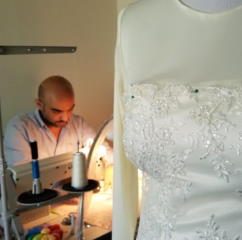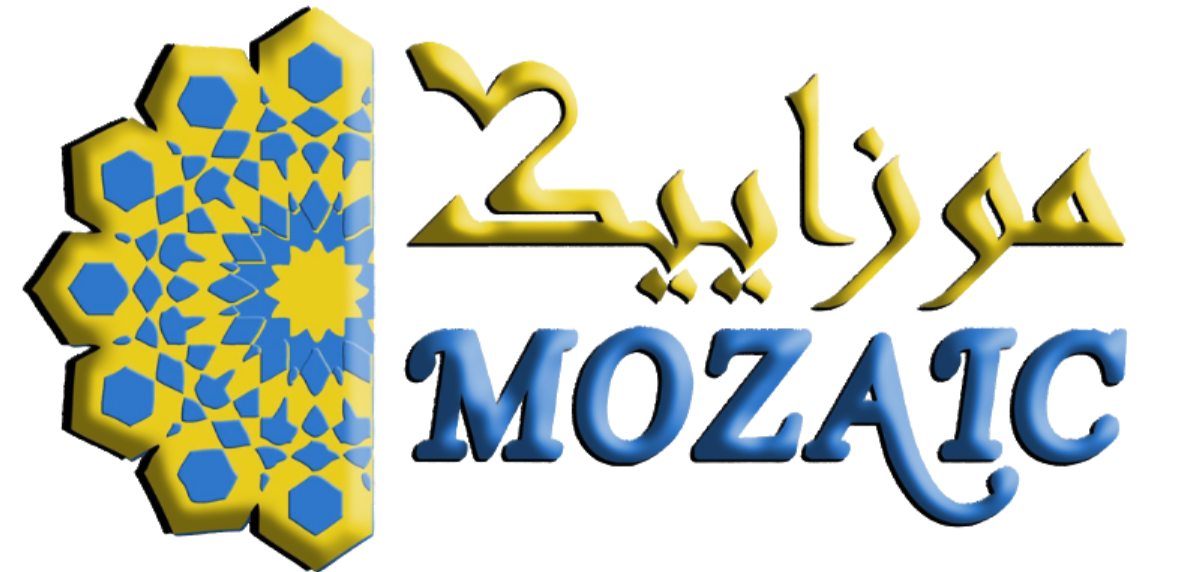Like most brides-to-be, Omama Altaleb, a 23-year-old journalist, was consumed with finding the perfect wedding dress.
“I wanted a kind of classic, vintage-style dress with all lace,” Altaleb said.
She was looking for something that would be perfect for her outdoor barn wedding and its shabby-chic vibe, but was also modest. Like many Muslim women, Altaleb wears the hijab, and wanted a dress that was both fashionable and in line with her values.
“It was very difficult to find something that would fit my body and at the same time, cover it,” Altaleb explained.
She thought it would be impossible to find the perfect dress — until she met Nader Briman.
Briman, 43, is a master dressmaker. He is also a Syrian refugee who arrived in the U.S. in January with his family after living five years in Egypt, settling in Hyattsville, Maryland.
Making a dream come true
(Photos by Carmel Delshad/WAMU and H&A Wedding Photography).
Sitting before Altaleb’s gown at his sewing machine, Briman reminisced about his past life in Syria.
“I had 75 machines like this in my factory,” he said, pointing down at the large industrial sewing machine in his bedroom.
Briman, who doesn’t speak much English, says in Arabic that he used to run a lingerie factory in Homs, Syria. He adds that crafting wedding gowns and lingerie is his passion.
“It runs in my blood. If I took a blood test, you’d find lingerie and wedding dresses,” Briman said with a chuckle.
Seeking the American Dream
The Briman family left Homs, Syria, in 2012, just one year into the war that has now stretched into its sixth year.
Briman says his factory, house and car were destroyed during the bombings that had become routine in his hometown. He says he doesn’t know which side was dropping the bombs — it didn’t matter. He wanted to get out, for the sake of his family.
“When the rockets drop, they don’t differentiate between kids, the elderly, anything. They just come to kill,” Briman said.
He moved with his wife and three children to Cairo, where he began sewing wedding dresses. He says it was hard leaving Syria.
“I feel like here, me and my children and my family will get chances to succeed. I feel like the world will open up for us here.”
“I felt a great deal of pain,” Briman said. “No one wants to leave their homeland. No one wants to be a refugee.”
The family registered with the U.N. in Egypt as refugees. After Briman suffered a series of health issues, including a heart attack, he said they were eventually offered the chance to move to America.
After nearly five years in Cairo, cultivating friendships and building a business, the family made the difficult decision to pack up and leave once again.
“We did this for our children,” Briman’s wife, Rasha, said. “Because in Egypt, there isn’t much of a future there for them.”
They arrived in the U.S. on Jan. 19, unsure of what was ahead.
“I wasn’t scared,” Briman said. “Quite the opposite, I was optimistic, and I am until now. I feel like here, me and my children and my family will get chances to succeed. I feel like the world will open up for us here.”
It’s that optimism that often fuels the story of every immigrant’s American Dream. But reality can be very different — and very hard.
Raghad Bushnaq knows this well.
Bushnaq is the co-founder of Mozaic, a local non-profit that helps refugees with things like furniture placement and rental assistance. Bushnaq’s group furnished Nader Briman’s apartment.
She says that few among her group’s estimate of 190 Syrian refugees living in the Washington area, have a trade or profession to fall back on like Briman. Bushnaq says some of the refugees are still very much affected by the war back home.

Raghad Bushnaq is the co-founder of Mozaic, a non-profit that helps refugees in the region. She works out of her home office and coordinates furniture and other donations for delivery to local refugees.Carmel Delshad / WAMU
“They are helpless, completely helpless,” Bushnaq said. “You guide them, you tell them what to do, you try to help them, but at the end of the day, they are in a huge depression so they can’t do anything.”
Bushnaq says she considers Briman lucky. Although there is a language barrier, he’s taking English classes and he’s actively looking for work. His wife’s sister and her husband are also in the area, so they have a family support system to fall back on. But most importantly, she says, Briman and his family have initiative.
“They’re looking for paying their rent and being decent people,” Bushnaq said. “They want to be independent, and stand on their feet quickly. Yes, they are traumatized, but there is still hope in their life.”
Working from the heart
The first time Briman went to the doctor in the U.S., he was given startling news: he had to be rushed to the hospital right away. Briman ended up having bypass surgery on his heart.
Briman knew that his passion for sewing and designing women’s clothes would be the only way he could make ends meet without taxing his health. But he needed a sewing machine that could handle both thick fabric and delicate lace.
A group of women in the Mozaic nonprofit collected donations to buy Briman a 250-pound industrial sewing machine, and then uploaded photos of his work on Mozaic’s Facebook page. Altaleb’s sister-in-law tagged her in the post, and once Altaleb saw the photos, she says knew exactly where to go to get her dream wedding dress.
“Briman has an understanding of what Muslim girls, hijabi girls are going for, because he has that expertise from Syria, from Egypt,” Altaleb said.
Altaleb’s gown is illuminated by sequins. A scalloped lace neckline blooms further into more clusters of lace. Delicate pearls adorn the gown, giving it the perfect feel for Altaleb’s outdoor wedding.
During their first meeting at a fabric store, Briman and Altaleb went shopping. He convinced her to go for a more modern off-white gown, instead of a traditional stark white one.
“Off-white has its own beauty and uniqueness,” Briman said. “White has become a little dated, like my grandmother’s generation wore it,” he joked.
In all, it took Briman about a month to make the dress, between buying and cutting the fabric to hand-sewing the pearls and aligning the lace on the train.
For Briman and his family, this dress is more than just a wedding dress: It could be the key to a sustainable future.
“This is my first dress in America, of course,” Briman said. “And God willing, there will be more dresses in the future. I have an idea for a venture, and hopefully it’ll work out.”
But first – he had to show the finished gown to Altaleb.
That ‘Tingly Feeling’
One week before her summer wedding, Altaleb knocked on Briman’s door, anxious to see her dress.
“I’m sorry,” Briman said, with a twinkle in his eye. “The dress isn’t ready yet.”
Altaleb took a breath and asked how much longer it’ll be until she sees her gown.
“Hopefully after the wedding,” Briman said, laughing.
Briman is full of zingers like this. His wife, Rasha, chastised him for scaring Altaleb.
Finally, the moment arrived. Altaleb opened the door to the Briman’s bedroom and saw her dress.
“Oh wow,” she exclaimed. “Wow, it’s so nice!”
“Take a photo of the surprised look on her face,” Briman said.
“It’s so pretty – can I wear it now?” Altaleb asked, before trying her dress on one last time before the big day. She turned to the side, admiring the train in a mirror held up by Rasha in the family’s living room.
Altaleb, beaming, said the dress is everything she wanted in a wedding gown.
“When I try it on, I get that like, tingly feeling, like, ‘Oh my god, I’m getting married and this is my dress,’” Altaleb said.
She can’t wipe the smile off her face. Altaleb gently touched the lace on her gown, lifting the train and taking it all in as Briman looked on with pride.
“I hope I can achieve what I achieved in Syria,” Briman said. “That I have my own business again, that my children have a good future and they achieve their dreams. And I believe in America, they will get their chance.”
If there’s anything that’s a good omen for a new beginning, it’s a wedding dress.












